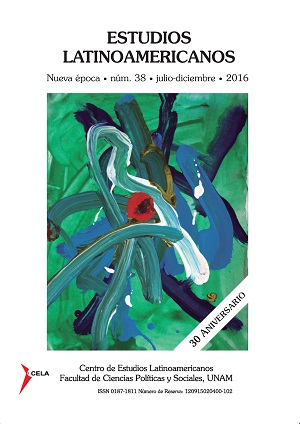Criminal and territorial agreement
Main Article Content
Abstract
Downloads
Article Details
Citas en Dimensions Service
References
Bibliohemerografía
ABADI, Anabella (2014), Muertes por violencia en Venezuela comparadas con el mundo. Dirección URL: <http://prodavinci.com/blogs/las-muertes-por-violencia- en-venezuela-comparadas-con-el-mundo-por-anabella-abadi-m-numeralia/>.
BERTAUX, Daniel (1986), “La imaginación metodológica”, en Revista Internacional de Sociología, Madrid, vol. 44, fascículo 3, julio-septiembre, traducción de A. Moreno.
BRICEÑO LEÓN, Roberto (2013), “Los ciclos de la violencia en Venezuela”, en Tribuna del Investigador, vol. 13.
CASTILLO, Anabel (1994), “La violencia cotidiana en Venezuela. El caso de un bar- rio”, en La Violencia en Venezuela, Caracas, Monte Ávila/UCAB.
DEL OLMO, Rosa (1994), “Aproximación al diagnóstico de la seguridad ciudadana en Venezuela”, en El Desarrollo Humano en Venezuela, Caracas, Monte Ávila.
GRUPO TORTUGA (2007), “Escalofriante entrevista con ‘Marcola’, líder carcelario brasileño”, 4 de enero. Dirección URL: <http://www.grupotortuga.com/Esca lofriante-entrevista-con>.
MORENO, Alejandro et al. (2009), Y salimos a matar gente, Caracas, Editorial Convivium.
OBSERVATORIO VENEZOLANO DE VIOLENCIA (OVV) (2012), Informe. Dirección URL: .
OBSERVATORIO VENEZOLANO DE VIOLENCIA (OVV) (2014), Informe. Dirección URL: <http://observatoriodeviolencia.org.ve/ap-content/uploads/2015/02/ovv-informe-del- 2014.pd-/>.
RAMÍREZ, Deivis (2013), “Zonas de Paz tienen su toque hamponil”, en El Universal, 3 de noviembre. Dirección URL: <http://www.eluniversal.com/sucesos/131103/ zonas-de-paz-tienen-su-toque-hamponil>.
REYES, Theis (2014), “Maduro anunció la creación de ‘territorios de paz’”, en El Universal, 27 de enero. Dirección URL: <http://www.eluniversal.com/nacional- y-politica/140127/maduro-anuncio-la-creacion-de-territorios-de-paz>.
RÍSQUEZ, Rona (2015), “Zonas de paz: corredores para el libre comercio de la droga”, en El Portal Web Runrunes, 17 de junio. Dirección URL: <http://runrun.es/ nacional/venezuela-2/207830/zonas-de-paz-corredores-para-el-libre-comercio- de-la-droga.html>.
THOMAS William I. y Florian ZNANIECKI (1927), El campesino polaco en Europa y América, Madrid, Centro de Investigaciones Sociológicas/Boletín Oficial del Estado, edición a cargo de Juan Zarco.
UNIDAD DE INVESTIGACIÓN RUNRUNES (2015), “En Tocorón, el riesgo es que te quieras quedar”, en El Portal Web Runrunes, 7 de agosto. Dirección URL: .

Este obra está bajo una licencia de Creative Commons Reconocimiento-NoComercial-SinObraDerivada 4.0 Internacional.

